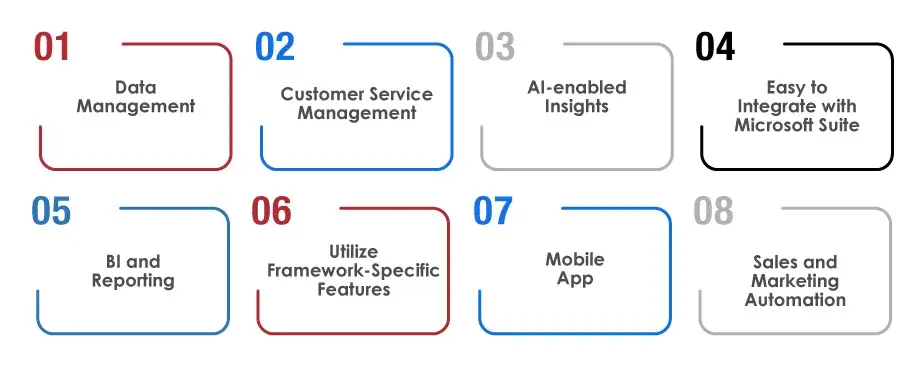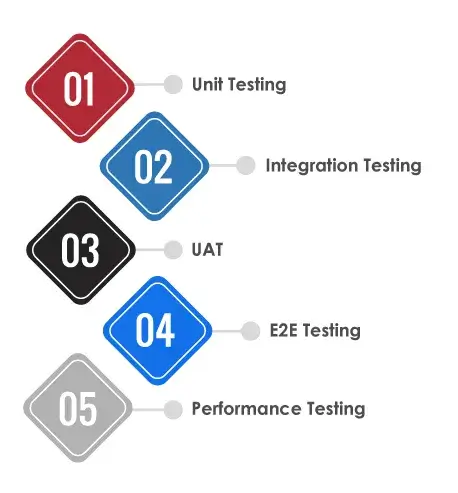Recommended Blogs
Why is MS Dynamics CRM Testing Crucial for Business Success?

- What is MS Dynamics CRM?
- How can MS Dynamics CRM Help Businesses?
- Why is MS Dynamics CRM Testing Crucial?
- Key Factors that Require Testing
- Testing Types Necessary to Test MS Dynamics Application
- What’s the Tx Approach to MS Dynamics CRM Testing?
- Summary
According to research, the CRM market is expected to grow by $156.3 billion by 2032. Unsurprisingly, AI-based applications like MS Dynamic 365 CRM are quickly expanding as businesses with over ten employees use CRM to manage their tasks. Customer relationship management (CRM) involves using technology to organize, synchronize, and automate marketing, technical support, sales, and customer service. It allows businesses to reduce costs, enable workflow automation, follow up with potential leads, and increase profitability.
Traditionally, ERP and CRM software solutions were separate systems organizations used to manage office work. However, with an integrated ERP and CRM software system, businesses can handle data and information (sales, finance, accounting, project, and marketing data) at their fingertips and streamline decision-making. It also helps prevent revenue leakage, facilitates proper coordination between inventory and sales, manages customer information with 360-degree visibility, and simplifies data entry.
This is why Microsoft developed MS Dynamics 365, which combines all CRM and ERP features into a single platform.
What is MS Dynamics CRM?

MS Dynamics CRM, or Microsoft 365 Dynamics, is a software package comprising five customer relationship management (CRM) solutions. It allows organizations to enhance customer relationship practices by focusing on sales, customer service, and marketing processes. The five business modules targeted by the Dynamics suite of applications are:
- Sales
- Customer Service
- Project Operations
- Marketing
- Field Service
While MS Dynamics integrates all these modules seamlessly, it allows users to use them separately. MS Dynamics 365 is a next-gen cloud-based business application that unifies ERP and CRM software applications in one platform. It helps simplify the app creation and data-sharing process across all Dynamics 365 applications.
Why is it Popular?
MS Dynamics CRM is popular among organizations for various reasons. It enables businesses to organize their client/customer details in a single location, which makes communication easier and provides an optimized customer experience. The software has a user-friendly interface and doesn’t require too much employee training. Businesses can customize it according to their requirements and make it work however they want. This also helps improve sales and customer relationship management. Its key benefits include:
- Security, reliability, and privacy enhancement
- Business process flexibility and scalability improvement
- Keep data at a single location
- Easy to customize based on business requirements
- Improve productivity and collaboration
- Free up IT resources from mundane tasks
How can MS Dynamics CRM Help Businesses?

According to research, CRM systems hosted on the cloud receive better and faster features with every new update. MS Dynamics 365 CRM delivers many features to empower businesses with streamlined processes, growth-driven insights, and better customer relationship management. Some of its crucial business benefits include:
Data Management:
MS Dynamics CRM has a central database enabling businesses to store and manage customer data (contact details, preferences, and communication history). It offers a 360-degree view of customer information to facilitate better understanding and personalized services.
Customer Service Management:
An enterprise’s customer services team can log and track user inquiries, manage tickets, and deliver proper support service. The Dynamics 365 customer services module can provide faster, more personalized services and improve customer engagement. Its AI-enabled chatbots and knowledge center further enhance the self-service feature.
AI-enabled Insights:
MS Dynamics leverages AI/ML to provide predictive analytics, behavioral analysis, lead generation, and recommendations functionalities. This level of data-driven decision-making and personalized experience enables enterprises to improve their business processes.
Easy to Integrate with Microsoft Suite:
Businesses can seamlessly integrate their MS Dynamics CRM with other Microsoft applications like Outlook, SharePoint, and Microsoft 365. This feature improves productivity and enhances collaboration.
BI and Reporting:
Its detailed reporting and analytics capabilities offer valuable insights into marketing strategies, customer behavior, and sales performance. Businesses can leverage data-driven insights to improve their revenue outcomes.
Mobile App:
The MS Dynamics mobile application offers users on-the-go access to CRM data and functionalities. It enables the sales and customer support services team to improve their productivity. At the same time, they can access the app via tablets and smartphones to interact with clients/customers and manage leads, sales data, market opportunities, etc.
Sales and Marketing Automation:
Businesses can automate their sales processes, such as quote generation and lead management and tracking. They can manage leads, follow up with prospects, and close deals faster. Sales automation would provide smart insights to facilitate better sales cycle management. Marketing teams can create and execute targeted campaigns, analyze outcomes, and track user engagement rates. By automating marketing workflow, businesses can improve their lead generation rate and ROI.
Why is MS Dynamics CRM Testing Crucial?
Dynamics 365 is a complex web application with nested iFrames, deep object trees, and dynamic IDs. However, it is an essential tool for modern enterprises to function effectively, handle critical workflows and back-end systems, and seamlessly integrate business plans. But to ensure that it supports and meets business objectives and goals, organizations must conduct thorough MS Dynamics CRM testing before using it. Following are some of the reasons why MS Dynamics CRM testing is necessary:
- Each business has a unique set of requirements, which must be configured case-to-case when syncing MS Dynamics with a specific domain.
- Customized implementation is done leveraging APIs and dynamic code based on requirements.
- The company has to migrate all its data from legacy solutions to Dynamics, which requires careful data supervision.
- Dynamics 365 receives regular updates, which might impact its implementation during customization, configuration, and integration. In this context, testing becomes a mission-critical task.
- Businesses might consider integrating MS Dynamics with existing EPR and CRM solutions, including tools like Office 365, Outlook, and other third-party applications.
- Some enterprises might still be using outdated Soap API, which needs to be rewritten in WebAPI. This requires professional QA expertise and a testing environment.
Key Factors that Require Testing

E2E testing of MS Dynamics CRM ensures flawless workflow across the platform and external systems. Implementing it is a complex process requiring proper supervision because a minor bug or error can cause millions in damage and jeopardize a brand’s reputation. Also, when business-critical data (employees’ and clients’ information) is at stake, it is better to approach a specialist. Let’s take a quick look at some of the critical factors of MS Dynamics 365 that need rigorous testing:
- D365 apps transformation
- Manage frequent path updates
- Continuous evolution
- Data migration for legacy systems to D365 or AX (Dynamics AX) to D365
- Custom configurations
Testing Types Necessary to Test MS Dynamics Application

MS Dynamics CRM integration requires rigorous testing to ensure it syncs seamlessly with business workflows and functions efficiently. Let’s take a quick look at some of the MS Dynamics CRM testing types that businesses should never skip:
Unit Testing:
This testing type focuses on verifying individual units or elements within a software application. It accesses distinct CRM entities, JavaScript functions, configurations, workflows, and plugins that make a CRM work. The .Net-based testing frameworks, Moq, etc., are some tools that can be leveraged to perform unit testing of Dynamics 365.
Integration Testing:
Integration testing involves evaluating connections and relationships between multiple software elements. It determines whether the units are working in sync and producing accurate results. This also ensures that the integration between components does not throw any unnecessary defects or errors during data exchange, protocol communication, etc. Its test cases involve database interaction, messaging systems, and API calls.
UAT:
User acceptance testing (UAT) evaluates whether or not the Dynamic CRM meets the user’s expectations and syncs with business requirements. It gives assurance that the software solution is performing as expected and is accepted by the user.
E2E Testing:
Businesses will use MS Dynamics CRM integrations with MS products like Word, SharePoint, Office, Outlook, etc. This will need external integrations like CI/CD pipelines, databases, custom workflows, APIs, etc., and the process involves multiple interactions within the CRM system. The result? The system will be very complex, where each element is critical for the E2E business process. This is why E2E Dynamic CRM testing is an important step to ensure a seamless business workflow.
Performance Testing:
This is a non-functional testing type that will determine the speed, responsiveness, stability, and scalability of the Dynamics CRM application.
The other MS Dynamics CRM testing involves functional/non-functional testing, manual testing, security testing, and test automation.
What’s the Tx Approach to MS Dynamics CRM Testing?
Organizations are rapidly migrating to MS Dynamics 365, which can also create bottlenecks or complexities, hindering the migration process. That’s why testing becomes a necessity. As a leader in the digital assurance and quality engineering space, TestingXperts (Tx) has been a trusted partner for many enterprises globally that want to move from traditional to conventional modern workflows. We leverage the best testing approaches, methodologies, and practices suitable for all project types, such as transformation, migration, support, implementation, and rollouts.
The MS Dynamics implementation could become complex and raise challenges in the testing phase. If you lack even the slightest product expertise and testing practices, it will become difficult for you to integrate. Tx, with its years of experience in CRM and ERP domains, offers best-in-the-industry QA practices, methodologies, and approaches for the benefit of the global business ecosystem. We have our in-house accelerators, like Tx-SmarTest, Tx-Automate, etc., to monitor test case performance and implementation at every stage from initial to production. Partnering with Tx will give you an edge over your competitors in moving from traditional CRM practices to MS Dynamics 365.
Summary
To ensure MS Dynamics CRM testing is a valuable investment, businesses must understand the platform’s significance and the need for thorough testing. MS Dynamics 365 CRM integrates essential CRM and ERP functionalities, empowering enterprises to streamline processes, manage data efficiently, and enhance customer interactions. Rigorous testing is crucial due to the complexity of the platform’s customizations, integrations, and frequent updates.
Key testing types include unit testing, integration testing, user acceptance testing (UAT), end-to-end testing, and performance testing. As a leader in digital assurance, Tx offers expert MS Dynamics CRM testing services, leveraging advanced tools like Tx-SmarTest and Tx-Automate to ensure seamless integration and smooth migration to Dynamics 365, delivering reliable, scalable, and efficient results for businesses.
Ready to transform your CRM solution? Contact our ERP testing experts to learn how Tx can assist with MS Dynamics CRM testing.
Discover more
Stay Updated
Subscribe for more info
